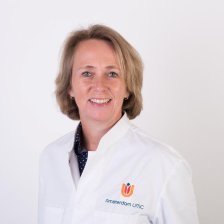Despite an early diagnosis and dietary treatment, many CG patients suffer from long-term complications such as cognitive impairment, movement disorders and in females primary ovarian insufficiency. The clinical outcome of patients is highly variable, even in patients with identical disease-causing mutations, and prognostic factors are lacking.
The aim of this study was to investigate if individual differences in residual galactose oxidation capacity are associated with differences in clinical outcome. We assessed the whole body galactose oxidation capacity in patients and controls with a noninvasive 1-13C breath test and used galactose metabolite profiling to assess the galactose oxidation capacity in fibroblasts of patients and controls. The association between galactose oxidation capacity and intellectual- (IQ) and neurological outcome (presence/absence of movement disorders) was investigated.
Both tests were able to distinguish a specific group of “variant” patients, diagnosed by newborn screening only (since 2007 in the Dutch NBS program), with previously unknown genotypes and phenotypes. These patients demonstrated a significantly higher galactose oxidation capacity compared to “classical” patients who were also detected before NBS by clinical symptoms. Importantly, the young “variant” patients so far demonstrate a normal clinical outcome. Their long-term outcome has to be awaited but their residual galactose metabolism might be sufficient to prevent long-term complications. Within the group of “classical” patients, differences in residual galactose oxidation capacity were not associated with clinical outcome.
Amsterdam UMC researchers involved in this project:
Researchers outside of Amsterdam UMC involved in this project:
Dr. H.H. Huidekoper - Department of Pediatrics, Center for Lysosomal and Metabolic Diseases, Erasmus MC, University Medical Center Rotterdam, The Netherlands
Dr. M.C.H. Janssen - Department of Internal Medicine, Radboud University Medical Center, Nijmegen, The Netherlands



